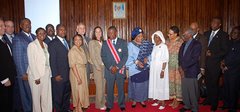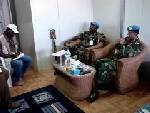

Confirmed sources from both the Executive Mansion in Liberia and State House in Freetown, indicate that Liberia’s President Ellen Johnson Sirleaf and Sierra Leone’s President Ahmad Tejan Kabbah both are planning a very proactive mediation role in the ongoing crisis in Guinea.
According to the GNN Freetown Correspondent, already, a Special Envoy sent by President Conte met with President Kabbah yesterday for over three hours following which the Envoy went back to Guinea with a Special Message for President Conte.
It can be recalled that there have been clarion calls for the Mano River Union Leaders to get more involved in resolving the civil crisis in Guinea. The Mano River Union is a grouping of the Three countries through which the Mano River runs, namely Guinea, Sierra Leone and Liberia.
The Mano River Women’s Peace Network (MARWOPNET) on January 24th this year expressed deep concern over what they considered as "the deteriorating situation in the Republic of Guinea" and which they noted has resulted in a, "reported loss of civilian lives and increasing hardship among the general populace" and which are causes of "grave anxiety across the Mano River Union and the world over" MARWOPNET has expressed fears that "the continuing explosive situation in Guinea", if not immediately addressed could spread to Liberia and Sierra Leone" thereby, "destabilizing the fragile peace and recovery processes". MARWOPNET had therefore called on Presidents Tejan Kabbah and Ellen Johnson-Sirleaf to intervene directly in the impasse between the antagonizing parties so as to facilitate a start of negotiations.
The Sierra Leone Labour Congress in a Release issued last week also called on the governments of Sierra Leone and Liberia to, "quickly intervene in order to stabilise the situation" whilst expressing concern that a spill over effect of the situation in Guinea would affect the Mano River countries and the West Africa sub region in general.
In an editorial published last Friday, one of Liberia's leading newspaper's the Daily Observer stated, "Currently the country of Guinea is under strict curfew and the military has powers to take any measures deemed necessary to maintain law and order. So fine, so good. But what happens when martial law is lifted and the people discover that nothing else has changed? We strongly suggest that beneath this canopy of uneasy calm, the President together with all the stakeholders- the Political parties, the Trade Unions, the youth groups, the market women should meet and begin to talk and work out a future for their country. Perhaps, it is important and opportune for the MANO River Union to come forward with such a suggestion; for while we welcome the condemnation made by the AU, what would be more helpful and welcome now is offering a solution for a way forward."
President Ellen Johnson Sirleaf returned from the United States of America yesterday Sunday February 18th after a successful trip to attend a Donor Conference which saw the United States Government and the federal Republic of Germany wiping out Liberia’s $391 Million and $235 million respectively owed them. Additionally, the American Government pledged another 500 million dollars towards the development of Liberia whilst black Americans led by the first African American billionaire, Robert L. Johnson, pledged to create an advocacy group to help restore and reconstruct Liberia in the same way American Jews have always lobbied to come to the aid of Israel whenever that country is in trouble.
Johnson Sirleaf therefore returned late last evening to Liberia in triumph to a country where the streets were lined with women, students, the young and the aged who loudly cheered as the popular leader drove by along the route from the airport to her offices in the center of Monrovia.
Our sources however inform us that President Johnson Sirleaf is so concerned about the deterioration of the crisis in Guinea that occurred during her absence in the United States, that she does not intend to bask in the love and applause she is currently enjoying as the popular leader of Liberia but she instead plans to immediately fly over to Sierra Leone this week to hold talks with President Kabbah following which the two leaders will start a mutually agreed upon plan to intervene in the crisis in Guinea.
Guinea's ailing head of state, Lansana Conte, is under pressure as never before as demonstrators paralyse the country with a general strike, demanding he resign. Since its formation, Conte’s Party for Unity and Progress (PUP) has won all elections in Guinea to date including legislative and communal elections.
Political opposition to President Conte is almost non-existent due to a combination of the repressive-style of rule from this soldier-turned-democrat on the one hand, and disunity among opposition political parties on the other. A constitutional change he made through a controversial referendum held in 2003 allowing limitless presidential terms, appears to have made him "president for life".
Donors complained that corruption was eating into the fabric of Mr Conte's society. There was no independent electoral commission, and the government held a monopoly over the national media. The donors held their monies back when the regime rejected calls for reforms. The economy started sliding and to compound the situation, President Conte who had been troubled by diabetes over the years, became more seriously ill. But people around him now took liberties with the running of the state and the economy was soon in tatters. Inflation reached a record high of 250% in 2005, and workers' salaries became all but worthless in the face of rising costs of basic goods. The unions called strikes to protect workers, they said. The latest strike has now resulted in people calling for the president's departure.
The President reacted by imposing a 20 hour curfew and has ordered the military to shoot anyone in open opposition to him on the streets. Scores of people have been shot and killed. The African Union has condemned President Conte in no undertain terms.
It is hoped the planned intervention by Presidents Kabbah and Johnson Sirleaf will resolve the crisis.
It can be recalled that there have been clarion calls for the Mano River Union Leaders to get more involved in resolving the civil crisis in Guinea. The Mano River Union is a grouping of the Three countries through which the Mano River runs, namely Guinea, Sierra Leone and Liberia.
The Mano River Women’s Peace Network (MARWOPNET) on January 24th this year expressed deep concern over what they considered as "the deteriorating situation in the Republic of Guinea" and which they noted has resulted in a, "reported loss of civilian lives and increasing hardship among the general populace" and which are causes of "grave anxiety across the Mano River Union and the world over" MARWOPNET has expressed fears that "the continuing explosive situation in Guinea", if not immediately addressed could spread to Liberia and Sierra Leone" thereby, "destabilizing the fragile peace and recovery processes". MARWOPNET had therefore called on Presidents Tejan Kabbah and Ellen Johnson-Sirleaf to intervene directly in the impasse between the antagonizing parties so as to facilitate a start of negotiations.
The Sierra Leone Labour Congress in a Release issued last week also called on the governments of Sierra Leone and Liberia to, "quickly intervene in order to stabilise the situation" whilst expressing concern that a spill over effect of the situation in Guinea would affect the Mano River countries and the West Africa sub region in general.
In an editorial published last Friday, one of Liberia's leading newspaper's the Daily Observer stated, "Currently the country of Guinea is under strict curfew and the military has powers to take any measures deemed necessary to maintain law and order. So fine, so good. But what happens when martial law is lifted and the people discover that nothing else has changed? We strongly suggest that beneath this canopy of uneasy calm, the President together with all the stakeholders- the Political parties, the Trade Unions, the youth groups, the market women should meet and begin to talk and work out a future for their country. Perhaps, it is important and opportune for the MANO River Union to come forward with such a suggestion; for while we welcome the condemnation made by the AU, what would be more helpful and welcome now is offering a solution for a way forward."
President Ellen Johnson Sirleaf returned from the United States of America yesterday Sunday February 18th after a successful trip to attend a Donor Conference which saw the United States Government and the federal Republic of Germany wiping out Liberia’s $391 Million and $235 million respectively owed them. Additionally, the American Government pledged another 500 million dollars towards the development of Liberia whilst black Americans led by the first African American billionaire, Robert L. Johnson, pledged to create an advocacy group to help restore and reconstruct Liberia in the same way American Jews have always lobbied to come to the aid of Israel whenever that country is in trouble.
Johnson Sirleaf therefore returned late last evening to Liberia in triumph to a country where the streets were lined with women, students, the young and the aged who loudly cheered as the popular leader drove by along the route from the airport to her offices in the center of Monrovia.
Our sources however inform us that President Johnson Sirleaf is so concerned about the deterioration of the crisis in Guinea that occurred during her absence in the United States, that she does not intend to bask in the love and applause she is currently enjoying as the popular leader of Liberia but she instead plans to immediately fly over to Sierra Leone this week to hold talks with President Kabbah following which the two leaders will start a mutually agreed upon plan to intervene in the crisis in Guinea.
Guinea's ailing head of state, Lansana Conte, is under pressure as never before as demonstrators paralyse the country with a general strike, demanding he resign. Since its formation, Conte’s Party for Unity and Progress (PUP) has won all elections in Guinea to date including legislative and communal elections.
Political opposition to President Conte is almost non-existent due to a combination of the repressive-style of rule from this soldier-turned-democrat on the one hand, and disunity among opposition political parties on the other. A constitutional change he made through a controversial referendum held in 2003 allowing limitless presidential terms, appears to have made him "president for life".
Donors complained that corruption was eating into the fabric of Mr Conte's society. There was no independent electoral commission, and the government held a monopoly over the national media. The donors held their monies back when the regime rejected calls for reforms. The economy started sliding and to compound the situation, President Conte who had been troubled by diabetes over the years, became more seriously ill. But people around him now took liberties with the running of the state and the economy was soon in tatters. Inflation reached a record high of 250% in 2005, and workers' salaries became all but worthless in the face of rising costs of basic goods. The unions called strikes to protect workers, they said. The latest strike has now resulted in people calling for the president's departure.
The President reacted by imposing a 20 hour curfew and has ordered the military to shoot anyone in open opposition to him on the streets. Scores of people have been shot and killed. The African Union has condemned President Conte in no undertain terms.
It is hoped the planned intervention by Presidents Kabbah and Johnson Sirleaf will resolve the crisis.




No comments:
Post a Comment